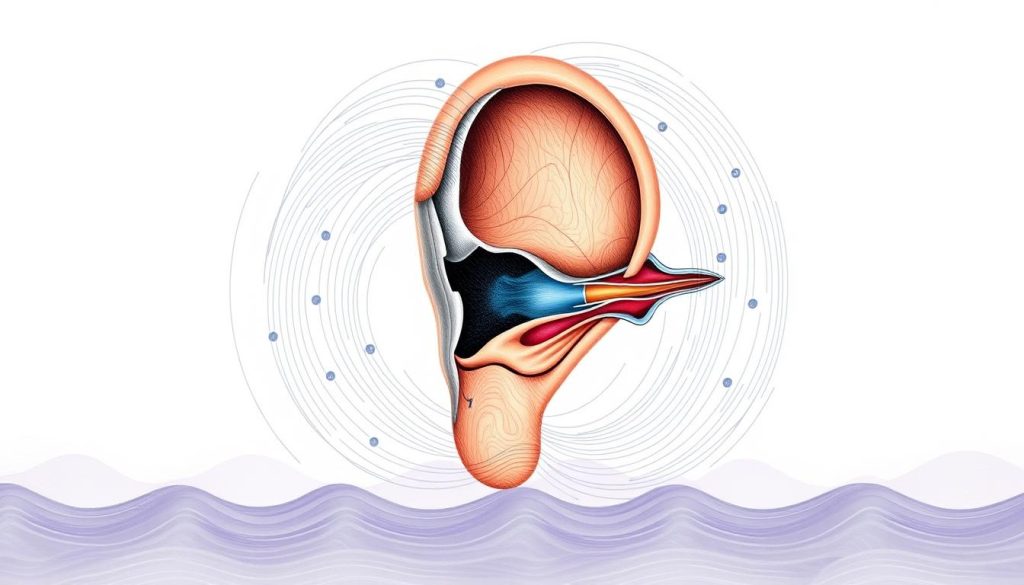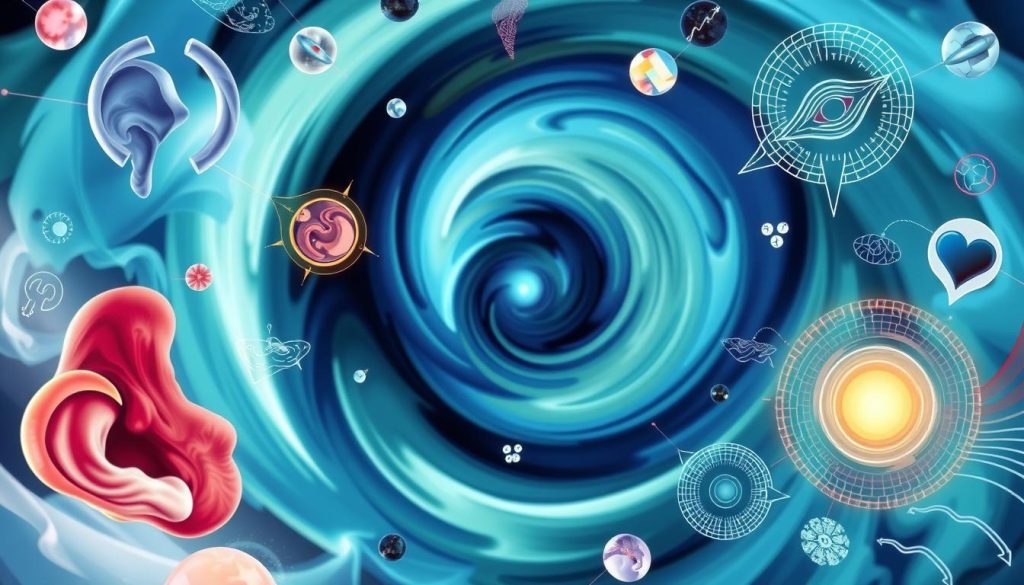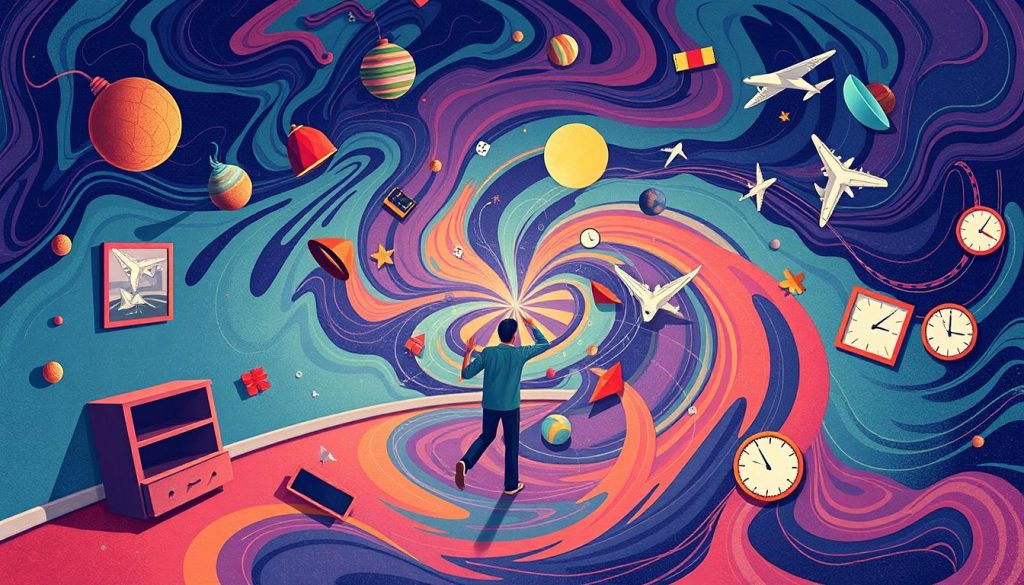Vertigo can make your world feel like it’s spinning. It’s a feeling of being dizzy or off-balance, even when you’re standing still. Knowing what causes vertigo and its symptoms is important for those who experience it.
Vertigo is more than just feeling dizzy. It’s a balance disorder that can come from many sources. Problems in the inner ear or neurological issues can trigger it. Understanding these causes is the first step to managing vertigo.
Symptoms of vertigo can vary. Some people have mild episodes, while others face severe and long-lasting ones. Common signs include feeling like you’re spinning, nausea, and trouble staying balanced. Spotting these symptoms early can help get a quicker diagnosis and treatment.
We’ll look into the common causes of vertigo, the medical conditions behind it, and its distinct symptoms. Knowing this can help find relief and get your balance back.
Understanding the Basics of Vertigo
Vertigo is a complex condition that affects many people. It’s often mistaken for simple dizziness, but it’s much more than that. Vertigo involves a spinning sensation and can be quite disorienting. Let’s dive into the basics of this balance disorder and explore its various aspects.
Difference Between Vertigo and Dizziness
While dizziness is a general feeling of unsteadiness, vertigo is more specific. It’s a false sense of motion or spinning. People with vertigo might feel like they’re moving when they’re standing still, or that the world is revolving around them. This distinction is crucial for proper diagnosis and treatment of vestibular disorders.
How the Balance System Works
Our balance system is a marvel of biology. It involves three main components:
- Eyes (visual system)
- Inner ears (vestibular system)
- Muscles and joints (proprioceptive system)
These systems work together to keep us stable. When one part malfunctions, it can lead to balance disorders and vertigo triggers.
Types of Vertigo Episodes
Vertigo episodes can vary in duration and intensity. Some common types include:
- Peripheral vertigo: Caused by inner ear problems
- Central vertigo: Stems from brain or nervous system issues
- Positional vertigo: Triggered by certain head movements
Understanding these types helps in identifying specific vertigo triggers and tailoring treatment approaches. By grasping these basics, we can better navigate the complex world of balance disorders and their impact on daily life.
What Cause Vertigo: Medical Conditions and Root Causes
Vertigo can be caused by many medical conditions that affect your balance system. Inner ear problems are often a key factor in vertigo episodes. Knowing the root causes is key for the right diagnosis and treatment.
Balance disorders happen when your balance system gets disrupted. This system includes your inner ear, eyes, and sensory nerves. If any part of this system goes wrong, you might feel vertigo.
Some common medical conditions that lead to vertigo are:
- Benign Paroxysmal Positional Vertigo (BPPV)
- Meniere’s Disease
- Vestibular Neuritis
- Labyrinthitis
- Acoustic Neuroma
These conditions mainly affect the inner ear. They mess with your balance and sense of space. For instance, BPPV happens when tiny calcium crystals in your inner ear move. This causes brief but intense vertigo episodes.
| Condition | Main Symptoms | Typical Duration |
|---|---|---|
| BPPV | Sudden spinning sensation | Seconds to minutes |
| Meniere’s Disease | Vertigo, hearing loss, tinnitus | 20 minutes to several hours |
| Vestibular Neuritis | Severe vertigo, nausea | Days to weeks |
| Labyrinthitis | Vertigo, hearing loss | Days to weeks |
| Acoustic Neuroma | Gradual hearing loss, balance problems | Ongoing |
Finding out why you have vertigo is crucial for the right treatment. If vertigo keeps coming back, see a doctor. They will check your inner ear and balance system.
Inner Ear Disorders as Primary Vertigo Triggers
Inner ear problems often lead to vestibular disorders, which are major vertigo causes. The delicate structures within our ears play a crucial role in maintaining balance and spatial orientation. When these structures malfunction, it can result in various types of vertigo episodes.

Benign Paroxysmal Positional Vertigo (BPPV)
BPPV is a common inner ear disorder that causes brief episodes of dizziness. It occurs when tiny calcium crystals in the ear become dislodged and move into the semicircular canals. This movement triggers false signals about head position, resulting in vertigo. BPPV symptoms often worsen with changes in head position.
Meniere’s Disease
Meniere’s disease is a chronic vestibular disorder characterized by recurring vertigo attacks. It’s believed to be caused by fluid buildup in the inner ear. Symptoms include intense spinning sensations, fluctuating hearing loss, and a feeling of fullness in the affected ear. These episodes can last from minutes to hours.
Labyrinthitis and Vestibular Neuritis
These conditions involve inflammation of the inner ear or vestibular nerve. Labyrinthitis affects both balance and hearing, while vestibular neuritis primarily impacts balance. Both can cause severe vertigo, nausea, and difficulty maintaining balance. These disorders are often triggered by viral infections and can lead to prolonged bouts of dizziness.
Understanding these inner ear disorders is crucial for proper diagnosis and treatment of vertigo. If you experience recurring vertigo symptoms, it’s essential to consult a healthcare professional for a thorough evaluation.
Common Symptoms Associated with Vertigo
Vertigo symptoms can range from mild dizziness to severe spinning. Knowing these signs helps spot balance disorders and their causes.
Those with vertigo often feel like the world is spinning. This feeling can cause nausea, vomiting, and balance issues. Some feel lightheaded or like they’re floating.
Other common symptoms include:
- Headaches or migraines
- Sweating
- Ringing in the ears (tinnitus)
- Abnormal eye movements (nystagmus)
- Blurred vision
Vertigo episodes can last from seconds to days. Some have brief spells, while others face long periods of dizziness.
| Symptom | Description | Associated Condition |
|---|---|---|
| Spinning sensation | Feeling of rotation or movement | BPPV, Meniere’s disease |
| Nausea and vomiting | Feeling sick to stomach | Vestibular neuritis |
| Balance problems | Difficulty walking or standing | Labyrinthitis |
| Tinnitus | Ringing or buzzing in ears | Meniere’s disease |
Spotting vertigo symptoms is key to getting medical help. If you’re always dizzy or notice these signs, see a doctor. They can find out why you’re dizzy and help you feel better.
Environmental and Lifestyle Triggers
Understanding what causes vertigo is key to managing it. Many environmental factors and lifestyle choices can trigger or worsen vertigo. Let’s look at some common causes of dizziness and balance problems.
Motion Sensitivity
Many people find motion sensitivity a big vertigo trigger. Activities like car rides, boat trips, or flying can trigger symptoms. Even watching fast-moving objects or scrolling on screens can cause dizziness.
To lessen these effects, look at a fixed point when traveling. Or take breaks from screens often.
Visual Triggers
Visual stimuli can be strong vertigo triggers. Bright lights, repeating patterns, or crowded places can overwhelm the balance system. Some find relief with tinted glasses or avoiding complex environments.
Slowly getting used to these triggers can help build tolerance over time.
Stress and Anxiety
Stress and anxiety can make vertigo worse. The body’s fight-or-flight response can upset balance mechanisms. Relaxation techniques like deep breathing or meditation can help manage stress-induced vertigo.
Regular exercise and enough sleep also help reduce anxiety and improve balance.
“Identifying and managing your personal vertigo triggers is key to reducing the frequency and intensity of episodes.”
By knowing these environmental and lifestyle factors, you can take steps to lessen their impact on your balance. Work with a healthcare professional to create strategies for your specific vertigo triggers and symptoms.
Medical Conditions That Can Cause Vertigo
Vertigo isn’t just about inner ear problems. Many medical conditions can also cause balance issues and dizziness. Knowing these connections is key to finding the right treatment.

Migraines and Vestibular Migraines
Migraines can make you feel like you’re spinning. Vestibular migraines hit the balance system hard. People with these migraines get dizzy, feel like they’re spinning, and are very sensitive to movement. These symptoms can last for hours or even days.
Neurological Conditions
Problems in the brain can mess with your balance. Issues like multiple sclerosis, brain tumors, and strokes can cause vertigo. The symptoms vary, but some people feel dizzy all the time, while others have it off and on.
Cardiovascular Issues
Heart and blood vessel problems can also cause vertigo. When blood flow to the brain is poor, you might feel dizzy and have balance issues. Conditions like arrhythmias or atherosclerosis could be the reason. If you suddenly feel vertigo and chest pain, get help right away.
Knowing these conditions can help find the cause of vertigo. If you’re always dizzy or have trouble balancing, see a doctor. They can figure out what’s wrong and suggest the best treatment.
Recognizing Warning Signs and Risk Factors
Vertigo symptoms can be scary, especially if they start suddenly. Knowing the warning signs is key to getting help fast. Look out for severe headaches, vision changes, or constant vomiting along with dizziness. These could mean a serious problem causing your vertigo.
There are different risk factors for balance disorders. Older adults are more likely to experience vertigo. People who have had head injuries or ear infections are also at higher risk. Some medicines can cause vertigo as a side effect. Spotting these risk factors early can help manage your condition better.
“Sudden onset of vertigo accompanied by other neurological symptoms warrants immediate medical evaluation.”
What triggers vertigo varies from person to person. Here are some common ones:
- Rapid head movements
- Changes in position
- Stress or anxiety
- Certain foods or drinks
Keeping a record of your vertigo episodes can help find patterns and triggers. This info is crucial for figuring out what’s causing your vertigo. If vertigo happens often or is very bad, see a doctor. They can check your symptoms and suggest the right tests or treatments for you.
Diagnostic Approaches for Vertigo
Diagnosing vertigo involves several methods to find the cause of dizziness and balance problems. Doctors use different techniques to identify vestibular disorders. They then choose the best treatment for vertigo.
Physical Examination Methods
Doctors begin with a detailed physical exam. They check your eye movements, head position, and balance. The Dix-Hallpike test is used to find BPPV, a common vertigo cause.
During this test, the doctor moves your head in certain ways to trigger symptoms.
Imaging Tests
Doctors may use imaging tests if needed. MRI scans can show brain tumors or multiple sclerosis. CT scans help find bone or inner ear problems.
These tests are key for diagnosing complex balance disorders.
Balance Assessment Tests
Special tests check your balance system. Videonystagmography (VNG) records eye movements to check inner ear function. Posturography measures balance on different surfaces.
These tests help find specific vestibular disorders. They guide vertigo treatment plans.
- Electronystagmography (ENG)
- Rotary chair testing
- Vestibular evoked myogenic potentials (VEMP)
Accurate diagnosis is crucial for effective vertigo treatment. Doctors use physical exams, imaging, and balance tests. This way, they tailor treatments to each patient’s specific vestibular disorder.
Treatment Options and Management Strategies
Effective vertigo treatment combines medical help and self-care. Doctors create plans based on each patient’s needs. They aim to fix the cause of the symptoms.
Medications
Medicines are crucial for vertigo. Antihistamines lessen dizziness and nausea. For severe cases, anti-nausea drugs are used. Diuretics help with fluid buildup in the inner ear.
Physical Therapy
Physical therapy is key for vertigo. It includes exercises to improve balance. The Epley maneuver helps with BPPV. Regular exercises boost stability.
Lifestyle Modifications
Making small changes in daily life can help a lot. Avoiding triggers and staying hydrated are important. Getting enough sleep and reducing stress also help.
| Treatment Type | Examples | Benefits |
|---|---|---|
| Medications | Antihistamines, Anti-nausea drugs | Reduce dizziness and nausea |
| Physical Therapy | Vestibular exercises, Epley maneuver | Improve balance, treat BPPV |
| Lifestyle Changes | Trigger avoidance, Stress reduction | Decrease frequency of episodes |
Using a mix of treatments often works best. Regular check-ups with doctors help keep treatment on track. This ensures the best results and any needed changes.
Prevention Techniques and Lifestyle Changes
Preventing vertigo episodes can make a big difference in your life. Start by figuring out what triggers your vertigo. Keep a journal to note down activities, foods, or situations that cause symptoms. This helps you make better choices every day.
Regular exercise is key in managing balance disorders. Try gentle activities like yoga or tai chi to improve your balance and lower fall risks. Staying hydrated and having a regular sleep schedule are also simple yet effective ways to manage vertigo. These habits support your overall health and may reduce episode frequency.
Managing stress is crucial in preventing vertigo. Use relaxation techniques like deep breathing or meditation to keep stress down. Also, create a calm home environment with good lighting and less clutter. By making these lifestyle changes, you can better control your symptoms and live a fuller life despite vertigo.
FAQ
Q: What is the main difference between vertigo and general dizziness?
A: Vertigo makes you feel like you’re spinning, even when you’re not moving. General dizziness can make you feel lightheaded or unsteady, but without the spinning feeling. Vertigo often comes from ear or brain issues, while general dizziness can have many causes.
Q: What are the most common causes of vertigo?
A: Common vertigo causes include BPPV, Meniere’s disease, and ear problems. Migraines, head injuries, and some medicines can also cause it. Rarely, brain tumors or strokes might be the reason.
Q: How long do vertigo episodes typically last?
A: Vertigo episodes can last from seconds to hours, depending on the cause. BPPV might only last a minute, while Meniere’s can last hours. Vestibular neuritis or labyrinthitis can last days or weeks. If vertigo lasts a long time or is very bad, see a doctor.
Q: Can stress trigger vertigo?
A: Yes, stress can trigger vertigo in some people. It can affect your balance and make neck and shoulder muscles tense. Stress relief techniques and lifestyle changes can help reduce vertigo episodes.
Q: Are there any home remedies for vertigo?
A: Home remedies like the Epley maneuver and staying hydrated can help. Avoid sudden head movements and get enough sleep. Some people find ginger tea or supplements helpful, but talk to a doctor first.
Q: Can vertigo be a sign of a serious health condition?
A: Most vertigo is not serious, but it can be a sign of something more serious. Severe headaches, vision changes, or weakness on one side of the body could mean a stroke. If you have bad vertigo, see a doctor right away.
Q: How is vertigo diagnosed?
A: Doctors use a few methods to diagnose vertigo. They’ll check your balance and eye movements first. They might do more tests like MRI scans or hearing tests. Specialists like ENTs or neurologists might also be involved.
Q: What treatments are available for chronic vertigo?
A: Treatment for chronic vertigo depends on the cause. It might include exercises, medicines, or surgery. A doctor will create a plan based on your symptoms and cause.
Q: Can vertigo be prevented?
A: Some vertigo can be prevented, but not all. Stay hydrated, manage stress, and avoid triggers. Regular exercise and managing health conditions can also help. Prevention plans vary by cause.
Q: Is it safe to drive with vertigo?
A: It’s not safe to drive during a vertigo episode. Vertigo can make it hard to drive safely. Talk to your doctor about when it’s okay to drive again.


















